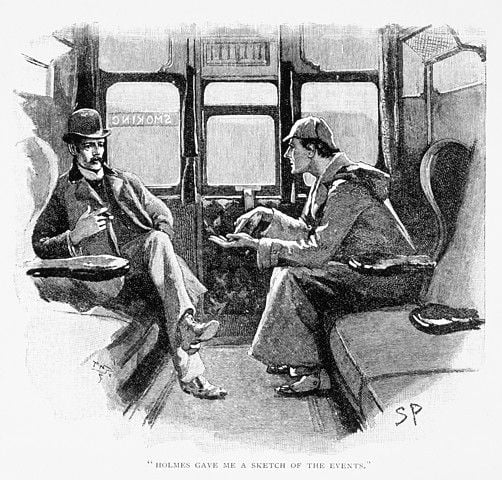![Memoirs_of_Sherlock_Holmes_1894_Burt_-_Illustration_2-206x300[1]](http://the-digital-reader.com/wp-content/uploads/2014/07/Memoirs_of_Sherlock_Holmes_1894_Burt_-_Illustration_2-206x3001-103x150.png) In what could
be the preface for the key copyright ruling of 2015, lawyers for the estate of
the long deceased Arthur Conan Doyle filed an appeal before the US Supreme
Court this week.
In what could
be the preface for the key copyright ruling of 2015, lawyers for the estate of
the long deceased Arthur Conan Doyle filed an appeal before the US Supreme
Court this week.
Lawyers for the Conan Doyle estate
are asking the USSC to a temporary stay of the June 2014 ruling
by the 7th Circuit Court of Appeals while the lawyers file a formal
appeal. The request comes after the 7th Circuit refused to stay its decision on
9 July.
Update: The request for the temporary stay has already been
rejected.
Today’s appeal is the latest (and
last, hopefully) stage in an 18 month long legal battle which will decide a
critical point in copyright law.
Starting in February 2013,
California lawyer and Holmes aficionado Leslie S. Klinger has been fighting a
legal battle with the Conan Doyle estate over the exact copyright status of
Holmes, Watson, and other literary creations of Conan Doyle. According to the estate,
the characters and other details created by Conan Doyle are still under
copyright, even though many of the stories written by Conan Doyle have fallen
into the public domain.
Arthur Conan Doyle has been dead for
84 years, but due to extensions to copyright terms, ten of the 56 short
stories he wrote about Sherlock Holmes are still in copyright. All of the short
stories and the four novels were published between 1887 and 1927, and all of
the works except the ten short stories have entered into the public domain in
the US as copyrights expired. These works also entered the public domain in
much of the world in the year 2001, 70 years after the author’s death.
On the basis of the 10 stories, the
Conan Doyle estate has been collecting fees from any American publisher or
media company which used the characters created by Conan Doyle.
 Klinger disagreed with the
estate’s interpretation, and in February 2013 he filed a lawsuit in order to
get a definitive ruling on the matter. He was inspired to sue after the Conan
Doyle estate had blocked the publication of his latest Holmes anthology, In the Company of Sherlock Holmes.
Klinger disagreed with the
estate’s interpretation, and in February 2013 he filed a lawsuit in order to
get a definitive ruling on the matter. He was inspired to sue after the Conan
Doyle estate had blocked the publication of his latest Holmes anthology, In the Company of Sherlock Holmes.
Klinger had declined to pay the
license fee demanded by the estate, even though he (or rather, his publisher)
had paid license fees for his previous Holmes works, including The New
Annotated Sherlock Holmes, The Sherlock
Holmes Reference Library and The Grand Game:
A Celebration of Sherlockian Scholarship.
Klinger’s lawyer’s won the lawsuit
in December 2013,
and then they won the appeal before the 7th Circuit in June 2014.
The appeals court concurred with the district court, ruling that elements of
stories in the public domain can be used by anyone because the stories are in
the public domain.
Naturally the Conan Doyle estate
doesn’t appreciate that the ruling has taken away its cash cow, and they are
now appealing to the US Supreme Court.
The Conan Doyle estate is asking for
a temporary stay of the appeal court ruling while they file an appeal before
the US Supreme Court. Lawyers for the estate are asking for the temporary stay
because Klinger has not submitted his new ontology to the estate, so they
have no way to determine if it uses any elements from the 10 stories under
copyright. (The fact that this issue could be resolved after the fact like any
other copyright infringement case seems to have escaped the Conan Doyle
estate.)
The estate’s application was filed
with Justice Elena Kagan, who is responsible for handling requests for
temporary legal orders from cases from the 7th circuit. The Klinger case
against the state began in federal district court in Illinois. Justice Kagan
has the authority to grant or deny the stay request on her own, and she can also
choose to share it with her colleagues or for a response from Klinger before
making a decision.
It’s difficult to say what Kagan
will decide, but it’s worth noting that she was part of the majority opinion in
the 2012 Kirtsaeng
decision. That case affirmed the concept of the First Sale
doctrine, limiting the control a copyright holder has over a work once it has
been sold.
The post Conan Doyle
Estate Asks Supreme Court to Remove Sherlock Holmes from Public Domain
appeared first on The Digital
Reader.

No comments:
Post a Comment